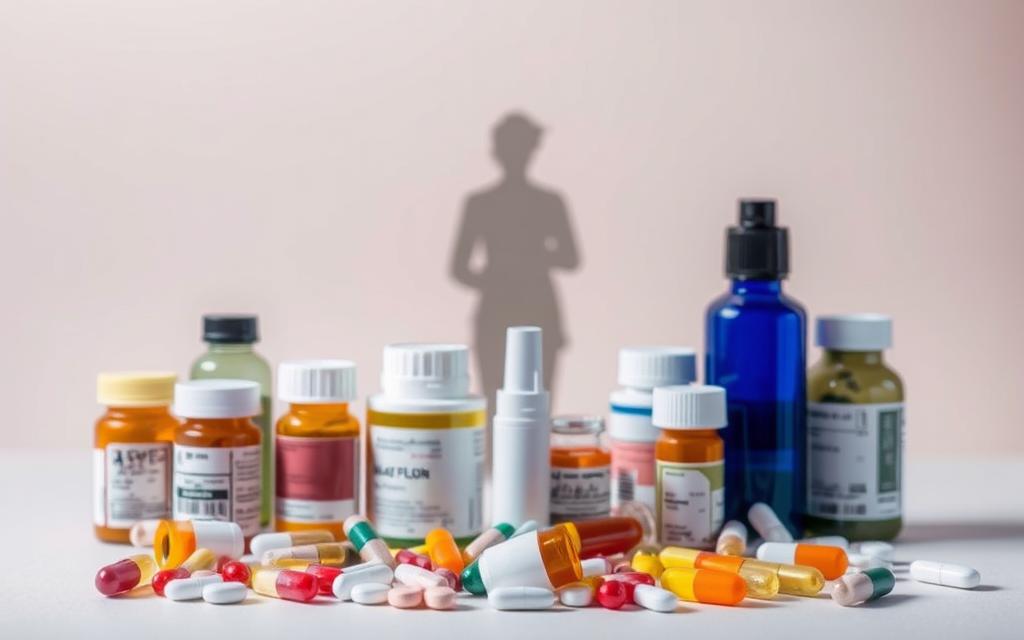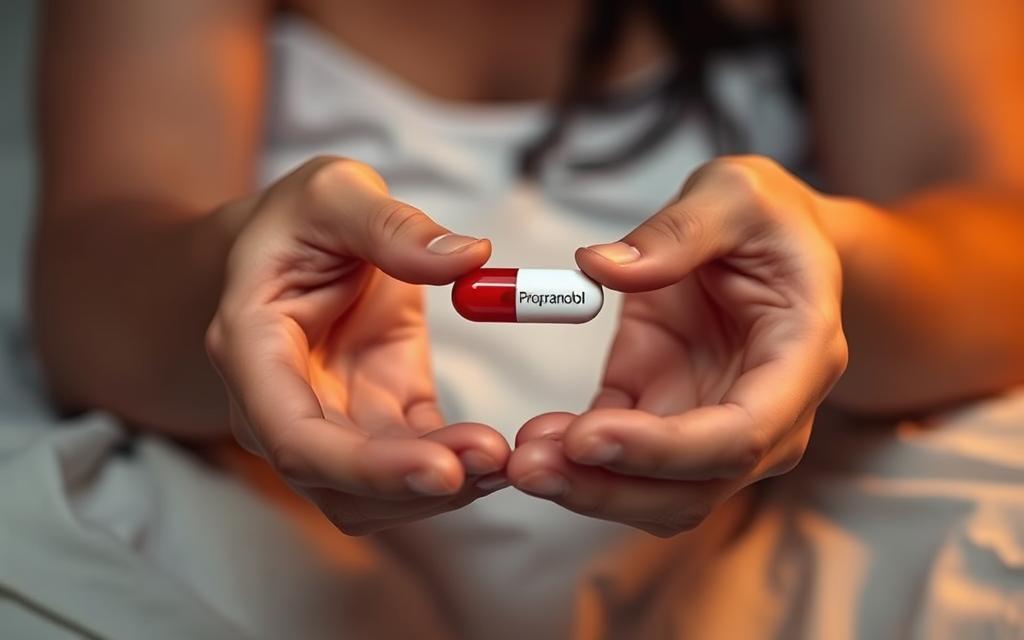Does Propranolol Cause Erectile Dysfunction? | Understanding the Impact on Sexual Health
Propranolol, a commonly prescribed beta-blocker, is used to manage various cardiovascular conditions. However, its impact on sexual health has raised concerns among patients.
One of the significant concerns is the potential link between propranolol and erectile issues. While the medication is effective in managing heart-related conditions, its effects on sexual wellbeing are not entirely understood.
Understanding the relationship between propranolol and erectile dysfunction is crucial for patients who are prescribed this medication. It’s essential to explore how this beta-blocker affects sexual health and what patients can do to mitigate any adverse effects.
Understanding Propranolol and Its Medical Uses
To understand the potential effects of propranolol on sexual health, it’s essential to first grasp what propranolol is and how it works. Propranolol is a beta-blocker medication that has been widely used for various cardiovascular conditions.
What is Propranolol?
Propranolol is classified as a beta-blocker, a type of medication that reduces the workload on the heart and opens up blood vessels, causing the heart to beat slower and with less force.
Common Conditions Treated with Propranolol
Propranolol is used to treat a variety of health issues, including hypertension, angina, certain heart rhythm disorders, and other cardiovascular conditions. It’s also used off-label for performance anxiety, migraine prevention, and essential tremors.
| Condition | Description | Propranolol’s Role |
|---|---|---|
| Hypertension | High blood pressure | Reduces blood pressure |
| Angina | Chest pain due to reduced blood flow to the heart | Decreases frequency and severity |
| Heart Rhythm Disorders | Abnormal heart rhythms | Helps regulate heart rhythm |
How Beta-Blockers Work in the Body
Beta-blockers like propranolol work by blocking the effects of the hormone epinephrine (adrenaline) and by slowing the heart rate, reducing the heart’s workload, and its need for oxygen.
The Connection Between Cardiovascular Medications and Sexual Health
Cardiovascular medications play a crucial role in managing heart health, but their impact on sexual function is a significant concern. Many individuals taking these medications experience changes in their sexual health, which can be distressing.
How Heart Medications Can Affect Sexual Function
Heart medications, including beta-blockers like propranolol, can influence sexual function by affecting blood flow and hormone levels. Beta-blockers, in particular, are known to potentially cause erectile dysfunction by reducing blood pressure to levels that may not support adequate erectile function.

Common Cardiovascular Drugs Associated with ED
Several cardiovascular drugs have been linked to erectile dysfunction, including certain beta-blockers, diuretics, and antihypertensive medications. Understanding the potential side effects of these medications is crucial for managing both heart health and sexual wellbeing.
The Importance of Cardiovascular Health for Sexual Function
Maintaining good cardiovascular health is essential for sexual function, as it ensures adequate blood flow to the genitals. A healthy cardiovascular system supports overall sexual health, highlighting the need for a balanced approach to managing heart health and sexual wellbeing.
Propranolol and Erectile Dysfunction: Examining the Evidence
Clinical evidence regarding propranolol’s influence on erectile dysfunction is varied and complex. The relationship between this medication and sexual health has been the subject of numerous studies, yielding a range of findings.
Clinical Research Findings
Several clinical studies have investigated the potential link between propranolol and erectile dysfunction. A 2018 meta-analysis published in the Journal of Clinical Hypertension found that beta-blockers, including propranolol, were associated with a higher risk of erectile dysfunction compared to other antihypertensive medications.
Reported Incidence Rates
Reported incidence rates of erectile dysfunction in patients taking propranolol vary significantly across studies. A study in the British Journal of Clinical Pharmacology noted an incidence rate of approximately 10% among patients on propranolol, though this figure can be influenced by numerous factors including dosage and patient demographics.
| Study | Incidence Rate of ED | Sample Size |
|---|---|---|
| 2018 Meta-Analysis | 14.2% | 5000 patients |
| British Journal of Clinical Pharmacology Study | 10.5% | 1200 patients |
Patient Experiences and Case Studies
Patient experiences with propranolol and erectile dysfunction can provide valuable insights into the real-world impact of this medication. Case studies have highlighted instances where patients experienced significant sexual dysfunction that resolved upon discontinuation of propranolol, underscoring the potential causal link between the medication and sexual health issues.
Physiological Mechanisms Behind Propranolol-Related ED
The physiological effects of Propranolol on erectile function are multifaceted, involving vascular, neurological, and hormonal aspects. To understand how Propranolol may contribute to erectile dysfunction, it’s essential to examine these factors in detail.
Effects on Blood Flow and Vasodilation
Propranolol, as a beta-blocker, affects the cardiovascular system by reducing heart rate and blood pressure. However, this action can also impact blood flow to the penis, a critical factor in achieving an erection. Reduced vasodilation, or the ability of blood vessels to widen, can impede the necessary blood flow for erectile function. Research has shown that medications like Propranolol can influence vascular health, potentially contributing to erectile dysfunction. For more information on the relationship between blood pressure and erectile dysfunction, visit Colorado Urologists.
Neurological and Hormonal Impacts
Propranolol may also affect neurological and hormonal pathways related to erectile function. The drug can influence the nervous system’s control over vascular responses, potentially impairing erectile function. Additionally, hormonal balances, particularly testosterone levels, play a crucial role in sexual health. While Propranolol is not directly linked to significant hormonal changes, its overall impact on physiological processes can indirectly affect sexual function.
Distinguishing Side Effects from Other Causes
It’s challenging to attribute erectile dysfunction solely to Propranolol, as many factors can contribute to ED, including underlying health conditions and other medications. A thorough medical evaluation is necessary to determine the cause of erectile dysfunction in individuals taking Propranolol.
Does Bypass Surgery Help Erectile Dysfunction? Cardiovascular Interventions
The relationship between bypass surgery and erectile dysfunction is complex, involving various physiological and psychological factors. Bypass surgery, or coronary artery bypass grafting (CABG), is a cardiovascular intervention aimed at improving blood flow to the heart. However, its effects on erectile dysfunction (ED) are multifaceted.
How Bypass Surgery Affects Vascular Health
Bypass surgery can improve overall vascular health by enhancing blood circulation. Improved vascular health is crucial for erectile function, as erectile dysfunction is often associated with poor blood flow. By addressing the underlying cardiovascular issues, bypass surgery may indirectly benefit erectile function.
Research on Post-Surgical Sexual Function
Studies on the impact of bypass surgery on sexual function have shown mixed results. Some research indicates that successful bypass surgery can lead to improvements in erectile function, likely due to improved cardiovascular health. However, other studies suggest that bypass surgery may not directly alleviate erectile dysfunction and that other factors, such as psychological well-being and medication use, play significant roles.
Comparing Surgical and Pharmacological Approaches
Both surgical and pharmacological approaches are used to manage erectile dysfunction. While bypass surgery addresses the underlying cardiovascular issues, pharmacological treatments directly target erectile function. A comparison of these approaches is essential for determining the best treatment plan.
| Treatment Approach | Primary Focus | Potential Benefits |
|---|---|---|
| Bypass Surgery | Improving cardiovascular health | Enhanced blood flow, potential improvement in erectile function |
| Pharmacological Treatments | Directly improving erectile function | Effective for many men, quick results |
In conclusion, while bypass surgery is primarily a cardiovascular intervention, it may have implications for erectile dysfunction. Understanding the complex interplay between cardiovascular health and sexual function is crucial for developing effective treatment strategies.
Managing Sexual Side Effects While Taking Propranolol
For individuals experiencing sexual side effects from propranolol, there are several strategies that can help mitigate these issues. Effective management often involves a combination of communication with healthcare providers, adjustments to medication regimens, and exploration of alternative treatments.
Having Effective Conversations with Healthcare Providers
Open dialogue with healthcare providers is crucial. Patients should feel empowered to discuss their sexual health concerns, as these conversations can lead to tailored solutions. Documenting specific side effects and their impact on daily life can facilitate more productive discussions.
Healthcare providers can offer guidance on managing side effects and may suggest alternative approaches based on the patient’s overall health profile.

Potential Dosage Adjustments and Timing Strategies
Adjusting the dosage or timing of propranolol intake might alleviate sexual side effects. Reducing the dosage could minimize its impact on sexual function, although this should be done under medical supervision to avoid affecting the drug’s efficacy for its intended condition.
Timing strategies, such as taking the medication at a different time of day, might also help. For instance, taking propranolol after sexual activity could potentially reduce its interference with sexual function.
Alternative Beta-Blockers with Different Side Effect Profiles
In some cases, switching to a different beta-blocker might be beneficial. Certain beta-blockers, like nebivolol, have been noted for having a more favorable side effect profile regarding sexual function.
Discussing the possibility of switching medications with a healthcare provider can help determine if an alternative beta-blocker might be more suitable for the patient’s needs.
Treatment Options for ED in Patients with Cardiovascular Conditions
Managing erectile dysfunction in the context of cardiovascular health involves exploring multiple treatment pathways. Patients with cardiovascular conditions who are experiencing ED need to consider various factors, including their current medications, overall health status, and lifestyle.
ED Medications Compatible with Propranolol
For patients taking propranolol, it’s crucial to choose ED medications that are safe and compatible. PDE5 inhibitors, such as sildenafil (Viagra) and tadalafil (Cialis), are commonly used to treat ED. However, their interaction with beta-blockers like propranolol must be carefully managed.
- Sildenafil and tadalafil can be used with caution, but patients should be monitored for potential hypotensive effects.
- The dosage of PDE5 inhibitors may need to be adjusted based on the patient’s response and tolerance.
Lifestyle Modifications to Improve Sexual Function
Lifestyle changes can significantly impact both cardiovascular health and erectile function. Regular exercise, a balanced diet, and stress management are key components of a healthy lifestyle that can improve overall vascular health and potentially alleviate ED symptoms.
- Engaging in regular physical activity can enhance blood flow and overall cardiovascular health.
- A diet rich in fruits, vegetables, and whole grains can support vascular health.
Non-Pharmacological Approaches and Therapies
Beyond medications, several non-pharmacological approaches can help manage ED. These include counseling and sex therapy, which can address psychological factors contributing to ED. Additionally, alternative therapies like acupuncture and vacuum erection devices may offer benefits for some patients.
- Cognitive-behavioral therapy (CBT) can help address underlying psychological issues.
- Vacuum erection devices provide a non-invasive mechanical solution.
Conclusion: Balancing Heart Health and Sexual Wellbeing
Maintaining a delicate balance between heart health and sexual wellbeing is crucial, especially for individuals managing cardiovascular conditions with medications like propranolol. Throughout this article, we’ve explored the complex relationship between cardiovascular health and sexual function, highlighting the potential impact of beta-blockers on erectile dysfunction.
A holistic approach is essential for effectively managing both heart health and sexual wellbeing. This involves having open discussions with healthcare providers about potential side effects of medications, exploring alternative treatments, and adopting lifestyle modifications that promote overall cardiovascular health.
By understanding the interplay between heart health and sexual function, individuals can take proactive steps to achieve a balance that supports their overall wellbeing. Focusing on this balance enables individuals to manage their cardiovascular conditions while maintaining a healthy and fulfilling sex life.
